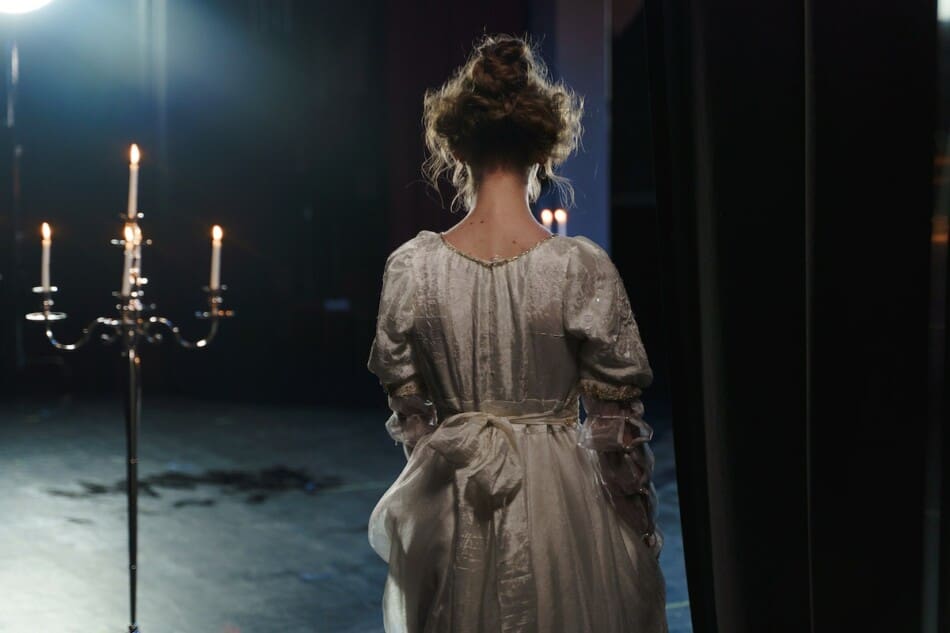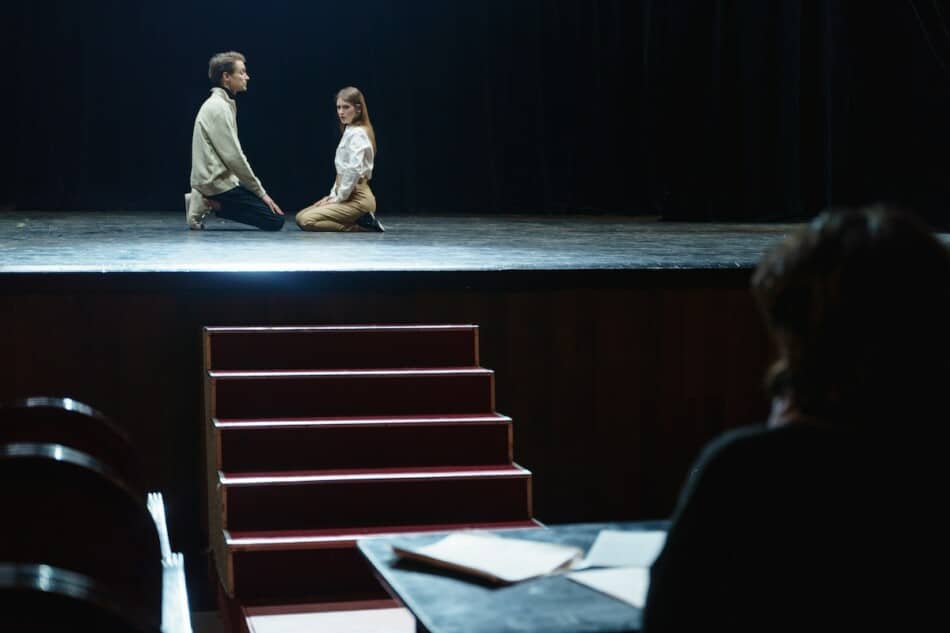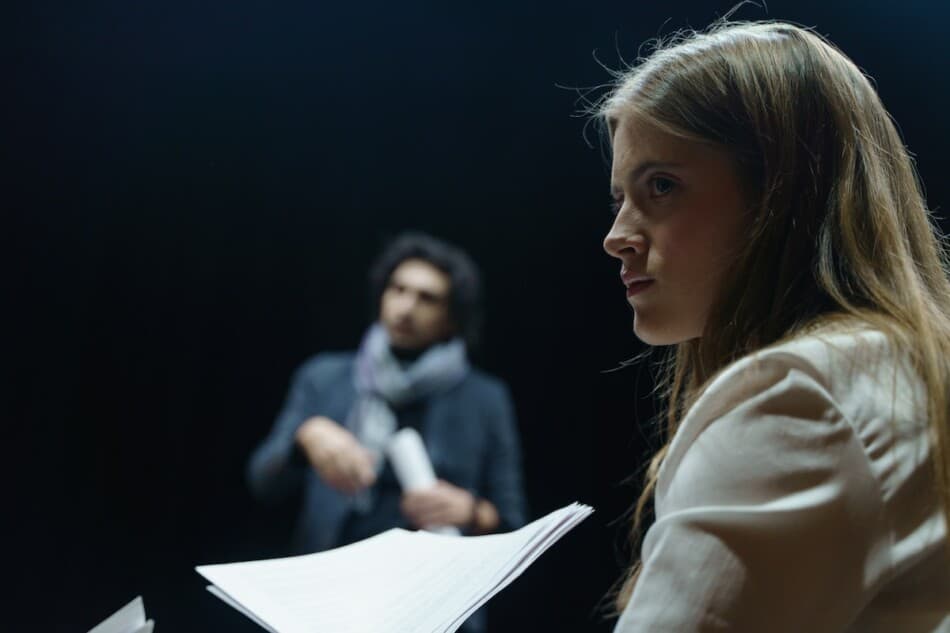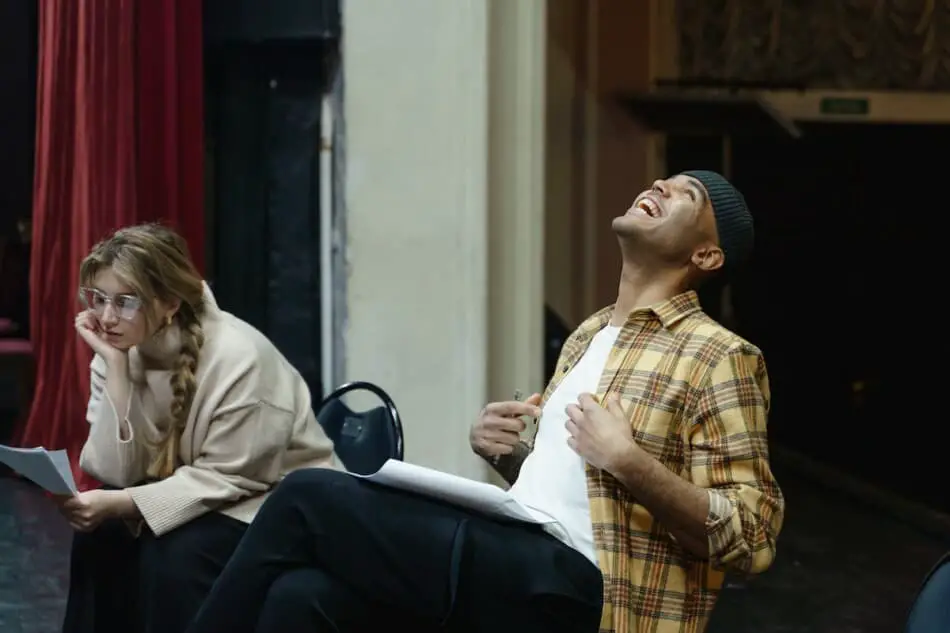Learning to act is a skill honed through many years of dedicated practice. Acting is learned through practicing the various skills involved in the craft while simultaneously observing others considered to be good actors.
Learning to act involves various aspects of the human psyche and body.
Acting is a craft best learned through the help of others in the industry. Aspiring actors need to practice their skills in front of experienced professionals. This will allow them to receive valuable feedback from those with the necessary expertise.
Your entire body is considered your instrument, and it is important to use the entire body to deliver a convincing performance.
Once you have learned a significant amount of acting theory, it is important to practice acting to allow you to hone the skill. Acting is a practical skill developed only through doing.
Study The Acting Craft
Before learning to act, familiarize yourself with the resources, you will need to explore:
- Talk to other actors, acting teachers, and anybody involved in the entertainment industry.
- Talk to psychologists or anybody else you know who specializes in human behavior.
- Exercise. Whether you regularly attend the gym or go for a run daily, you need to keep yourself physically fit to be a successful actor. Not only does your appearance matter tremendously in the acting world, but your body’s overall health and fitness will ensure that you are successful as an actor.
- Find books on acting. Do your research to find the best books available to teach you all you need to know about acting.
- Get your hands on as many high-quality scripts and monologues as possible. These will form an invaluable part of your acting education.
- Make a list of all your favorite movies and actors, and try to get hold of them so they are at your disposal.
The beginning stages of your acting education involve teaching yourself about the craft as far as possible. There are various ways this is achieved, and a budding actor needs to explore all possible avenues.
Studying the craft as thoroughly as possible will form a foundation upon which you can build your skills as an actor. This involves gathering as many resources about acting as you possibly can.
The resources include other people involved in the industry, books about acting, successful movies with good examples of powerful acting, scripts, and sides for plays and movies, and any other resource that could serve as a useful education in acting.
Studying the acting craft also involves learning all about the various acting techniques. This will help provide a foundation for further exploration of skills.

By studying acting, you will also learn about different performing methods and practice getting yourself into character.
This is achieved through reading various acting books and plays. This will allow you to boost your knowledge of different acting techniques and ensure that you understand various aspects of acting.
By studying acting books, you will learn how to get in touch with your emotions. At the same time, you will learn how to build characters that are convincing and authentic.
Reading plays will help you familiarize yourself with how scripts are created and how they ordinarily function.
You will understand the character development, the structure of the play, and how the story evolves.
Another important aspect of learning the craft is networking with other artists and actors. Not only will your network of performers help you in the future when looking for opportunities to practice your skills, but it will also allow you to observe how experienced actors approach their craft in person.
Networking with others in the acting field will provide opportunities to learn more about the craft, especially if you take up the opportunity to spend time on stage or on a film set.
Another way in which you can study the craft is by watching movies and series.
However, how you approach your viewing will be somewhat different from how you would ordinarily approach watching a movie. To learn about acting by watching movies, you must view it with an analytical eye.
Watch movies without sound – by watching a familiar movie without sound. You can focus on aspects other than the movie’s plot. You can view the movies with an analytical eye when there is no sound to distract you.
Firstly, you can analyze the placing of the characters on camera and how they interact. In addition, you can observe how the actors react to one another and other events that occur within the plot.
You will understand the subtle nuances of their facial expressions and how they react to different people and situations.
Watching movies without sound will also allow you to better understand the film’s mechanics. This includes – but is not limited to – the camera angles and other film elements.
-> Read Also What Is An Autodidact?
Learn Acting Basics Through Videos
There are countless videos on video platforms such as YouTube that can help you learn much of what you need to know about acting.
Successful actors such as Michael Caine have hosted various videos where they teach everything from basic techniques to more advanced techniques for seasoned professionals.
You will learn from industry professionals how to research roles through these types of videos. You will also learn how to study certain acting techniques and analyze scripts.
Plenty of videos available will also teach you to work with sides. This is an extremely important skill that all actors must master.
You need to learn how to break down a script into parts while analyzing the entire story from start to finish.
Online videos with professionals can also offer advice on memorizing lines from scripts with ease while adding all the necessary nuances required to create a believable performance.
-> Learn more about the 7 best websites for self-learning
Analyze Plays & Movies
It’s important to analyze plays and movies effectively. Working with sides is an essential skill for any actor. When you analyze a script for a play or film, it’s important to learn the entire story as far as possible.
Reading the entire script and familiarizing yourself with the story, you will understand how your character fits into the greater scheme. This will give you a better backstory upon which to base your character.
You will be able to better understand why the character acts the way he does. This will help you to give the most authentic performance possible.
Once you have read the entire story multiple times and you are familiar with the entire plot, you can start focusing on the parts where your character features most.
Analyze these scenes for hidden plot features and try to understand your character as thoroughly as possible.
Once you fully understand your character and are completely au fait with every aspect of their personality, you can start learning the lines, bearing in mind how they might approach each line.
As soon as you have been able to memorize the lines completely, you can begin adding the subtle nuances of the character into every line.

Practise Acting As Much As Possible
Arguably the most important part of learning to act is practice. The acting craft is developed only through practice; every bit of practice will help you become a better actor overall.
One of the best practices is to get involved in stage productions or film sets wherever possible. This will ensure that you have the opportunity to learn from others as far as possible.
No matter how small a part you may land in a production, it will be a great opportunity to practice everything you know about acting while carefully observing others and absorbing their skills.
Find out about your local community theatre and try to get involved wherever possible. Even if they only let you sweep floors, to begin with, you will soon have the chance to prove your skills in the acting realm.
Once you have successfully involved yourself in a live show, your confidence will grow, and you will find yourself better equipped to take on bigger roles in the future.
Practicing acting also involves voice exercises and various other exercises to further develop your skills as an actor. Script analysis is another important part of practicing acting that will help you adapt well to working with scripts.
Analyze each character, and practice the scripted dialogue multiple times, choosing a different character each time.
This will allow you to see the plot from multiple perspectives while ensuring you can perform completely different characters, thereby growing your skill set.
Impressions are another great way to practice acting. Impressions can be done easily and are extremely fun, but they are also excellent for developing your acting skills.
Pick any movie character, politician, or family member. Try your best to imitate them in every aspect – including their accent, mannerisms, body language, and manner of speaking.
Self-tapes are another way to help hone your skills as an actor. Begin by choosing a monologue or a short scene you can perform with a friend. This is a great way for you to build relationships with other aspiring actors and learn to work together.
Once you have learned the lines to the point where they come naturally, practice saying them in various ways to establish the best approach.

After identifying your favorite variations of your chosen scene, set up a camera to record yourself performing the scene. Watch yourself and carefully analyze your performance when you are finished filming the scene.
Take note of where you need to improve and what aspects you enjoyed about your performance.
Perform the scene over and over. Play the video back to yourself after each performance, and implement the necessary changes to improve the overall result.
Practicing short group scenes with your acting friends is a great way to enhance your skills while allowing everybody in the group to experience performing different characters.
The ability to feed off other actors is an extremely important aspect of acting.
In most cases, we do not act in isolation. Instead, we act with groups of people. Our performances are often made stronger through our interactions with others in a scene.
Audition
Once you have learned the acting basics and practiced a few different monologues or scenes from plays, you should try to go for auditions.
While you may not necessarily be strong enough in your skills to start landing leading roles, you will learn an enormous amount through the auditioning process.
Auditioning is the actor’s game. On average, actors will audition for far more roles than they ever actually land. However, auditioning is a learned skill that improves with each audition, making you a stronger candidate every time.
The experience of auditioning is extremely important for any actor. After each audition, you will gain more confidence that will equip you for future auditions. You will boost your acting skills and prove more resilient in the audition room next time.
Through auditioning, you will gain a better understanding of what is expected to land a role, and you will (hopefully) receive some constructive criticism that will help you further the development of your skills.
Go People Watching
As strange as it may sound, people-watching is an excellent exercise for any actor. When you sit at a café on a busy street or at a shopping mall, there are countless people around you that you can observe without being noticed.
This is particularly useful for an aspiring actor, as you can observe how various people act in public and how they interact with each other. You can observe their body language and watch the way they speak to each other.
This can help you to add various human archetypes to your mental bank, allowing you to draw on certain aspects of people’s personalities whenever needed.
People-watching is also a great opportunity to practice using your imagination. While observing people, you can come up with scenarios about what they are saying.
You can sit with a friend while people-watching and develop your own dialogue with the people you observe.
This forces you to carefully read body language, mood, facial expressions, and the movement of lips, all while using your imagination to create your own scenarios.

Practise Cold Reading
Cold reading is another excellent way to build your acting skills. Cold reading simply involves taking out a new piece, such as a monologue or play, and acting it out without having any prior experience with that particular piece.
By acting out the piece for the first time without any previous experience, you are stretching your acting muscle to a large extent.
It can be quite challenging to act out a new piece immediately after seeing it for the first time. However, it will force you to think on the spot and get yourself into character without forethought.
This is a brilliant way to challenge yourself; practicing this skill will prepare you for future auditions.
Use Your Imagination
The imagination is one of the most powerful elements of the human psyche. Harness the power of your imagination and improve your acting skills by setting the scene for an acting piece in your head.
Set the scene using only your imagination, and then perform the piece while interacting with your imagined space.
This will allow you to learn how to act as a character in the space you have created.
Practise Emotional Stretching
Emotional stretching is a brilliant way to build your acting skills. Begin by practicing your chosen scene or monologue the way it first comes to mind.
Next, attempt to perform the exact same scene with various different emotions.
These emotions can be drastically different from the original, such as acting out a happy scene in an angry manner, etc.
This will teach you to look at a scene from various directions, allowing you to experiment with the scene in several different ways.

Study Good Actors
Studying good actors is a sure way to develop your skills and find your own groove as an actor. Watch their movements, facial expressions, body language, and how they emphasize their words.
Observe what good actors do when they are not speaking.
Look at how they have approached a scene, and think how you might have done it differently.
It’s also extremely useful to watch different actors perform the same role and see how they have approached things differently.
Study Psychology
Acting is all about imitating the behavior of people other than yourself and adopting another person’s characteristics, body language, and overall personality.
Psychology plays a major role in acting as it is all about human behavior.
Every actor should study psychology in some respect. This will give the actor better insight into human behavior, allowing them to incorporate this knowledge into their craft.
-> Learn More about Self-Learning vs. Classroom Learning: Which Is Better?
Conclusion
Acting requires immense discipline and the ability to practice as much as possible. While it is possible to learn about acting on a theoretical basis, learning to act usually involves actually performing the action of acting as much as possible.
Learning involves observing others as they practice the craft, performing acting pieces on your own, and seeing how you can improve while learning the best acting techniques.
Sources
- https://www.uncsa.edu/news/20180718-acting-tips-for-beginners.aspx
- https://www.prospects.ac.uk/jobs-and-work-experience/job-sectors/creative-arts-and-design/7-skills-you-need-to-succeed-in-performing-arts
- https://theatreanddance.appstate.edu/students/prospective-students/25-life-skills-learned-theatre
- https://www.reddit.com/r/acting/comments/2pj2y8/how_can_you_learn_acting_without_any_classes/
- https://www.projectcasting.com/blog/tips-and-advice/can-learn-act-without-acting-classes/
- https://www.indeed.com/career-advice/career-development/how-to-become-an-actor-with-no-experience
- https://www.wikihow.com/Practice-Acting
- https://www.backstage.com/magazine/article/books-every-actor-shelf-10187/
- https://www.quora.com/How-do-I-learn-to-act-by-my-own-I-dont-want-to-act-in-movies-but-theatre-and-things-like-that-How-do-I-go-about-that
- https://www.backstage.com/magazine/article/learning-act-without-class-4116/
- https://www.nyfa.edu/student-resources/six-tips-for-becoming-an-actor/#:~:text=You%20will%20have%20the%20chance,to%20learn%20about%20film%20acting.






